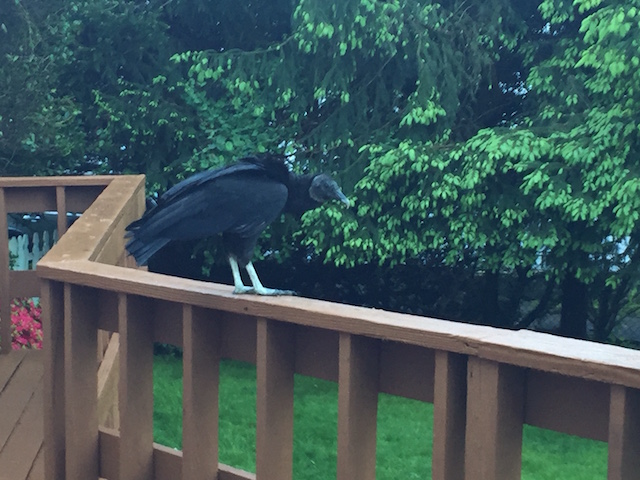My husband and I have been enjoying watching birds in our backyard. We have spotted some red robins, blue birds, woodpeckers, cardinals and occasional hummingbirds. Imagine my surprise when I looked out the kitchen and saw a black bird with a long beak, big claw feet and a wing span that appeared to be 5-feet wide.
Though it was only 6:30 in the morning, I immediately started calling wild animal rescue places and leaving messages. I even called the police asking for their help. I told them that I feared for the safety of two outdoor cats that we take care of. I had a callback from a very helpful woman from Volunteers for Wildlife Inc. in Locust Valley and she appeased me by telling me to send her a picture of the bird and she would get back to me as soon as possible. As I had thought, after researching the animal on the Internet, it was a vulture. She said that recently there have been sightings in Long Island and that they usually feed on dead animals and that our cats were not in danger.
I shared my concern with our daughter, who lives in Manhattan. She, on her end, reached out to the Audubon Society. She had been in contact with them once before when a large peregrine falcon landed on her balcony on the 25th floor of her apartment on the Upper East Side of Manhattan. She received a couple of responses by e-mails, one from someone who was not only unsympathetic to her cause but also extremely upset that her parents were feeding bird-eating cats. Our daughter told us, in her wittiness, “I did not mean to ruffle her feathers. I should have known who my audience was.”
She then heard from Richard Santangelo, the program director manager for “For the Birds.” After looking at the picture of the bird, he wrote her that it was a “black vulture, one of the two species of vulture in North America. Unlike more docile turkey vultures, which are more timid and feed on dead animal carcasses, black vultures can be more aggressive and have been known to attack small animals.” He said that “the bird might also just be resting from migration and will be gone soon enough.” He also added “that they are quite rare for the area so seeing one was a treat.”
We, on the other hand, were not seeing it as a treat and were hoping the vulture did not enjoy our cats as a treat.
But, all is well that ends well. The vulture left for good an hour or so later. He flew the coop. Bye bye, birdie.
Lilian Krowne
Great Neck



